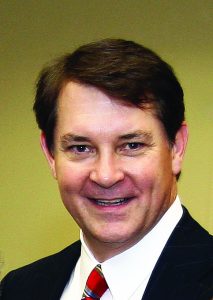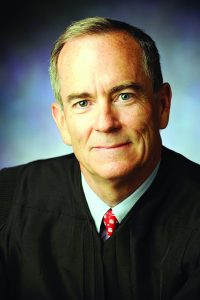Two seeking supreme court seat
Published 10:58 am Monday, October 24, 2016

Glenn Acree
GLENN ACREE
Glenn Acree has served on the Court of Appeals for the last 10 years, and for the last four years as the Court’s Chief Judge. He grew up in Metcalfe County, where, because of his dad’s disability, his family relied on government assistance to make ends meet.
He helped his family escape poverty by joining the U.S. Army, using the GI Bill and holding multiple jobs to pay for college and law school at the University of Kentucky, and even a master’s degree in American history from the University of Maryland.
For 21 years, he represented clients in Kentucky’s trial courtrooms and argued more than 50 cases in the appellate courts, winning most.He employed Kentuckians in his own small business and was active in the Lexington Chamber of Commerce.
He volunteers for charitable organizations like Junior Achievement, Susan G. Komen Fund, The Hope Center, LexArts and Little League Baseball to name a few.
As a judge, he spent hundreds of classroom hours to become one of less than 300 judges nationwide designated a Fellow of the prestigious Advanced Science and Technology Adjudication Resource Center in Washington, DC.
He created the Appellate Advocacy section of the Kentucky Bar Association and founded the local chapter of a lawyer mentoring organization, the American Inns of Court, serving as its first president from 2013 to 2015.
In 2014, the KBA honored him with its award for outstanding service to continuing education.
He serves on several committees of the Access to Justice Commission, is a board and finance committee member of the Kentucky Bar Foundation and is on the board of governors of the National Center for State Courts’ Council of Chief Judges. In his spare time, he plays music in a rock and roll cover band, Off The Clock.
He is married to the former Lisa Hahn of Versailles and has two sons, Matt and Taylor.

Larry VanMeter
LARRY VANMETER
Judge Larry VanMeter was elected to the Court of Appeals in November 2003 to serve Division 1 of the 5th Appellate District, comprising Anderson, Bourbon, Boyle, Clark, Fayette, Franklin, Jessamine, Madison, Mercer, Scott and Woodford counties. He was re-elected unopposed to the Court of Appeals in November 2006 and in November 2014.
VanMeter currently serves as the Investment Committee chairman of the Judicial Retirement Fund of the Kentucky Judicial Form Retirement Systems (JFRS) and as a member of the Civil and Appellate Rules Committees of the Kentucky Supreme Court.
He served two terms as chairman of the Board of Trustees of the JFRS, and served the Court of Appeals as acting Chief Judge during 2010 and as Chief Judge Pro Tempore from 2007 to 2010, and also served as the Court of Appeals’ representative on the Ethics Committee of the Kentucky Judiciary from 2004 to 2012, and as its alternate member on the Kentucky Judicial Conduct Commission from 2012 to 2016.
In addition, VanMeter has served on the Probate and Trust Legislative Committee of the Kentucky Bar Association, the Family Court Rules Committee of the Kentucky Supreme Court, the Chief Justice’s Fayette County Family Court Task Force and is a frequent speaker for continuing legal education.
VanMeter was born in 1958 in Lexington, and was raised in Winchester, the son of the late George and Carla VanMeter of Winchester. He received his undergraduate degree with a major in history in 1980 from Vanderbilt University, and his law degree in 1983 from the University of Kentucky College of Law, where he was a member of the Order of the Coif and the Kentucky Law Journal
VanMeter practiced law with the Lexington firm of Stoll, Keenon and Park from 1983 to 1994, where his practice areas included equine law, business planning and organizations, real estate, taxation, estate planning, trusts and probate. From 1994 to 1999, he served as a judge of Fayette District Court. Judge VanMeter was appointed to the Fayette Circuit Court bench in 1999 where he served until his election to the Court of Appeals.
VanMeter has been actively involved in a number of community organizations, including Little League Baseball, Lexington Youth Soccer, Boys’ and Girls’ Clubs of America, and Parents’ Place. He currently serves on the University of Kentucky Libraries National Advisory Board, and has served on the vestry of Christ Church Cathedral, on the Vanderbilt University Alumni Board of Directors and on the Sayre School Board of Trustees. He is a Fellow of the University of Kentucky, a Life Fellow of the Kentucky Bar Foundation and a Founding Fellow of the Fayette County Bar Foundation.
He is a member of Christ Church Cathedral. Judge VanMeter and his late wife, Lucy, are the parents of four children.
What makes you uniquely qualified to be a supreme court justice?
GA: I possess two qualities essential to a successful justice: empathy for people facing court challenges and problems of all kinds, and scholarship to improve the caliber of our court-based law. The first of those qualities comes from my personal experiences overcoming poverty and hardship, but also from more than 20 years standing with clients waiting for a jury’s verdict or judge’s ruling. It also comes from a lifetime of service to others, beginning with my years in the Army, to volunteering with many non-profits like the Hope Center, Susan G. Komen, and Junior Achievement. As for scholarship, in addition to undergrad and law degrees, I also have a Master’s degree in American history and I am one of fewer than 300 judges nationwide to become a Fellow of the Advanced Science and Technology Adjudication Resource Center in Washington, DC. I recently received the Kentucky Bar Association’s award for outstanding contributions to continuing legal education. And, other judges cite the opinions I author more frequently than those written by other sitting judges of the Court of Appeals.
LV: I currently serve as one of Clark County’s judges on the Court of Appeals. My combined 33 years of experience as a lawyer and judge give me a background which is unique to the current Supreme Court bench. As a practicing lawyer for 11 years, I gained practical experience in many areas of law, including equine, business planning, taxation, real estate, trust and estate planning, estate and probate administration, and routinely represented my clients in courts all over Kentucky. As a judge, I have more than 22 years of experience as a trial judge (district, circuit and family courts) and as an appeals judge. I have presided over thousands of cases, hearings and jury trials of all types: civil, criminal, family and juvenile. If elected to the Supreme Court, I would be only the third justice ever to have served at all four levels of Kentucky’s unified judicial system. I also have experience in Frankfort working with the General Assembly to pass legislation. The job of a Supreme Court justice involves building consensus with others, whether within the court on decisions, on committees or with the legislature or executive branch on legislation that impacts the court system. I have demonstrated the ability to do that. My diverse qualifications give me insight into our judicial system and have prepared me not only to do the job, but to do it well.
What do you believe are the most pressing issues the court will be addressing in the coming years?
GA: The biggest problem is the people’s lack of meaningful access to justice. In April, immediate past president of the ABA William Hubbard said that, in America, 80 percent of the poor and 50 percent of people of moderate means have no meaningful access to justice. The problem comes from antiquated thinking about our judicial processes. Kentucky once had an active Access to Justice Commission that took on the challenge or rethinking our processes. That led to Veterans Treatment Courts and dockets that I helped create. But our ATJ Commission has not met since funding expired a few years ago. My first priority would be to resurrect the Commission (without funding if necessary), and expand its scope to include a unique Fayette County child support court that helps rehabilitate young, jobless parents so they can earn income to take care of their responsibility, rather than putting them in jail where they will never be able to pay child support.
LV: In addition to hearing cases on appeal, the Kentucky Supreme Court plays an important administrative function: establishing rules governing the practice of law and the court system. In my view, the most pressing issue facing the Kentucky judiciary is the uneven allocation of judicial resources. Other issues confront our court system, such as the heroin crisis with its impact on dockets and the pension crisis with its potential impact on resources available to the court system, but uneven allocation of judicial resources creates delay in the resolution of cases, and needless and wasted expense to litigants and taxpayers. The problem is created by a mobile population, and the solution is not as simple as larger population areas needing more resources, since some areas with declining population have more needs in terms of criminal and family dockets. This issue should continue to be studied, and a plan developed in the near term with input from all interested constituencies, including the Kentucky General Assembly. The solution is achieved by building consensus, as I have done in other contexts: working with the Kentucky Supreme Court to implement rule changes, and with the General Assembly to pass legislation impacting the Judicial Form Retirement Systems.
Kentucky’s current administration has had decisions appealed to the state supreme court recently. Do you think it is likely other decisions from the governor’s office will come before the supreme court in the future? If so, why are you best suited to take part in ruling on those appeals?
GA: Gov. Bevin made no bones about seeking change through innovation, and he has done so aggressively. So, yes, I believe the Supreme Court will have to rule on the legality of the Governor’s future efforts to carry forward his agenda. Before I was a judge, I successfully represented my clients (including politically active trade associations) in a non-partisan, or at least bi-partisan, way. I found it the best way to practice law and it is why my former clients of both political parties support me in virtually equal proportions – because they know I do my very best to do what is right, according to law, and that’s all. Political partisanship has no place whatsoever on the bench, where judges should advocate for nothing but justice for the people of this Commonwealth.
LV: Throughout Kentucky’s history, the executive and legislative branches of government have gone back and forth on which branch will “set the agenda.” That struggle will certainly continue over the next eight years. I am best suited to take part in these decisions because I understand the express Separation of Powers mandate of Kentucky’s Constitution, and I understand the Court’s critical role in being a neutral arbiter of these disputes. Over the 22 years that I have been a judge, I have earned the respect of Democrats, Republicans and Independents as an impartial judge who applies the law fairly without regard to position, power or status. I will continue to advocate for concise, understandable, common sense decisions that adhere to notions of certainty and predictability, and recognize always that change, if it is to occur, should be well-considered.






